Whither Then?

One would have thought that the facts allow of only one conclusion. The forty-three year old and illegal occupation of the West Bank must end. There is actually no other viable solution, since the Palestinians - why should they? - are not about to concede that chunks of the remaining 22% of the land on which they and their ancestors formerly lived should be taken from them. Such a solution (were it to come about) of course involves difficult issues: notably that of refugees (who are legally entitled under international law to return to their former place of residence, but whom Israel scarcely wishes to receive) and that of the removal of the 450,000 settlers who at present live illegally in the West Bank. If agreement of these issues is impossible, there is of course another possible scenario: that there should be one shared, democratic, state from the river to the sea. There is of course no reason why there should not be built-in safe-guards for both communities (as is the case in Northern Ireland). Many thinking people (both Jews and Palestinians of the diaspora) believe this latter the better solution. Desiring their own state, it is a conclusion that most Palestinians living in the OPT have been loath to arrive at. But with the petering out of the ‘peace process’ in the autumn of 2010 there have been posters going up in the West Bank advocating a ‘one-state’ solution. Perhaps Palestinians must first have their own state and this could subsequently evolve into a federal arrangement.
(For further consideration of the merits of one/two-state/federal solutions click here.)
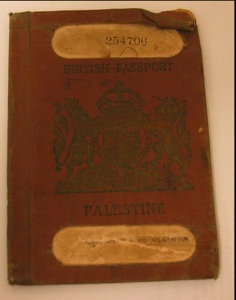
Flickr Commons
gnuckx
The joy of the present situation is that we do not have to engage in war to end Israeli occupation of what, by international agreement, is Palestinian land. For all its apparent invulnerability in the context of the Middle East, Israel is a small country, militarily and economically dependent on the West. Were the States simply to withhold privileged access to American military technology and markets (presumably both financial and commodity) that – so the American Israeli Jeff Halper judges - would go a long way to make the continued occupation too costly to sustain.(1) For their part the Europeans have every right to rescind (not simply to not upgrade) the Association Agreement that gives Israel privileged trading conditions. The preamble, Article 2, reads that the Agreement ‘shall be based on respect for human rights and democratic principles’, which principles are to guide the ‘internal and international policy’ of the contracting parties, stating that this constitutes ‘an essential element of [the] Agreement’. We in the West need to get our heads around the fact that, while we wring our hands, it is actually the West that is underpinning the Israeli regime. If one includes both military and other forms of aid, the United States pours a staggering $27 million into Israel a day,(2) money without which it could not continue to exist. The problem is that the American Jewish lobby goes into apoplexy at the slightest hint that the States might use its might, both economic and military, to achieve peace. Further, the West has psychological leverage. It may be the case that many Israelis appear increasingly hardened, but they do not actually want to be a pariah state. We have the means to bring about Israel’s conformity to a peaceful solution and that is what we need to do.
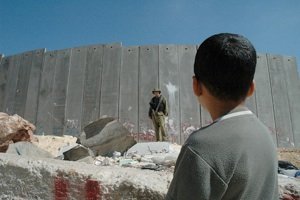
Justin McIntosh
Wikimedia Commons
An Israeli soldier and a Palestinian boy in front of the wall. Aug. 2004
Compare such a scenario with what the Americans are at present attempting. What a bizarre situation when the United States sends, of all people, Dennis Ross to the Middle East as a negotiator! At a recent AIPAC meeting Ross commented: ‘[A] Strategic Dialogue [in which he had just participated] is just one of many, ongoing, and high-level exchanges that occur regularly between the United States and Israel. … These type of exchanges … help solidify connections between our two governments. Over the last two years, I have seen four-star generals, intelligence officers, and high-ranking diplomats all develop personal relationships with their Israeli counterparts …’ and so forth. American attempts at interference in internal Palestinian politics have a record of misfiring. It was their arming Fatah in 2006 that led to Hamas taking pre-emptive steps to avoid the attempt to oust them in Gaza. What the Palestinians need is an honest broker and that the Americans have not been. But such a successful scenario as I have depicted remains at present a pipe-dream. The gap between what could be and what at present pertains is well symbolised by the fact that at present the Israelis have Barghouti in prison - on five consecutive life sentences! At least within Europe with the collapse of the ‘peace process’ there have been some signs of movement in the right direction. Significantly the statement issued after the meeting of the EU Foreign Affairs Council in 2010 spoke of the need for ‘close co-operation with Arab partners, building on the Arab Peace Initiative’.
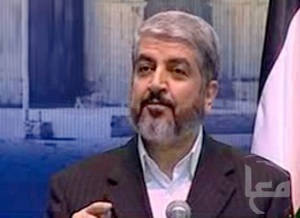
Ma’an Images, Ma’an News Agency, 24.01.10
Khaled Mashal
Western Perception
It is clear that for real change to take place there needs to be a metanoia - a turning around and a repentance - on the part of the West (in particular the Americans). It would seem that, if there is to be progress, a range of false perceptions and mis-readings will need to be overcome. Here I shall attempt to name them.
-
•‘Both Sides’
In the first place it is important that the false spin (constantly fed to an American audience) be overcome that the conflict is somehow ‘bilateral’; that ‘both sides’ have to be willing to make concessions. It is highly dangerous: what have the left Palestinians to give? M J Rosenberg, senior foreign policy fellow at Media Matters Action Network (who, interestingly, at one time worked for AIPAC and changed his mind) puts it well.
The Palestinians have no power at all although they have done everything that Israel and the United States demanded. The Palestinian Liberation Organisation (PLO) fully recognised Israel and pledged itself to fighting terrorism and resorting exclusively to negotiations to achieve a state. They agreed that their state would be limited to the 22% of historic Palestine that is the West Bank, Gaza and East Jerusalem – recognizing that Israel would have the other 78%. Even Hamas, which still insists that Israel has no right to be there, says that if the Palestinian Authority negotiates a deal with Israel that is accepted by the Palestinian people, it too will join in and end its war with Israel.
And what has Israel offered in exchange for these historic concessions? Absolutely nothing. Yes, it has played at negotiations. …’
The Palestinians have, quite literally, had everything taken from them: they languish in Israeli jails, their houses are demolished, their travel restricted – and the West does not even respect their democratic vote, which as one Palestinian put it is an ‘insult’.(4) Palestinians who live in Israel are in effect second-class citizens; while Palestinians in the West Bank live on about 14% of what was their land under British Mandate Palestine; and, hemmed in on all sides, Gaza is the world’s largest outdoor prison, its people reduced to subsistence level.
•‘Security’
Secondly the West should see through the wholly spurious argument - which the States has swallowed hook, line and sinker - that the Israelis need ‘security’. The Israelis have constantly used this as a subterfuge to hide behind, giving them the excuse for building the wall or maintaining the occupation. Given what has been the horrific nature of Jewish history, it is hardly surprising that Israelis should carry a legacy of insecurity and this should scarcely be belittled. But realistically it is monstrous. Since some time in the 1960s Israel has been more powerful than all its Arab neighbours put together - as was dramatically shown in the war of 1967, in which (as the Americans had reckoned would be the case) it defeated them collectively in six days. Israel’s military security is guaranteed by the most powerful nation in the world and Israel is a military power in its own. Economically, it towers over its neighbours. The truth of the matter is that, insofar as the Israelis experience any ‘insecurity’ this is on account of the fact that they are attempting to hold down a population as large as their own in a repressive military occupation. The Palestinians will rise up: as a popular Palestinian slogan has it ‘to exist is to resist’. And why do the Israelis do this? For security? Not a bit of it: because they put land-grabbing before peace. As that well-known Israeli military leader and politician Moshe Dayan put it: the settlements in the territories are essential ‘not because they can ensure security better than the army, but because without them we cannot keep the army in those territories. Without them the IDF would be a foreign army ruling a foreign population’.(5) The army is in the West Bank not to protect Israel but to protect illegal settlements. The Israelis need an excuse to be there.
‘The only way for Israelis to have security is, quite simply, to end the 35-year old Israeli occupation of Palestinian territory. Israelis must abandon the myth that it is possible to have peace and occupation at the same time, that peaceful coexistence is possible between slave and master. The lack of Israeli security is born of the lack of Palestinian freedom. Israel will have security only after the end of occupation, not before.’
Marwan Barghouti The Washington Post 16 Jan. 2002
•Hamas

Flickr Commons: frontpersatuannasional
Ismail Haniyeh
We should consider the criteria that the Americans have set (repeated by Obama in his Cairo speech) for Hamas’ participation in talks. In the first place we should note that – intriguingly – these criteria appear have been set up not in order to pave the way for Hamas’ participation, but precisely in order to have criteria in place that Hamas could not meet. In an article published in Al Jazeera in conjunction with the leaked Palestine Papers, Alastair Crooke writes that that a UN representative had told the UN Secretary General that the EU had endorsed the Quartet conditions for engagement with Hamas in order to prevent Hamas from meeting them.(8)
But how reasonable are these criteria in themselves? They are three in number.
(1) That Hamas put an end to violence. To which one could respond: (i) Has it not? (see Hamas/ Gaza/History and Background); (ii) Is it equally to be demanded of Israel that it ‘put an end to violence’, from the torture of Palestinian child prisoners to the assault on Gaza?; (iii) It is it not the case, recognised by international law, that when invaded or subjected to violence a people have the right to protect themselves? (This one is admittedly complex and is discussed below.)
(2) That Hamas agree to abide by past agreements. Again one might reply: (i) Has it not abided by what it has signed up to, as in the case of the truce of 2008? (History and Background); (ii) Has Israel abided by either the spirit or the letter or past agreements (such as Oslo), while it breaks with impunity international law as in the Geneva Conventions?(9) (iii) Why should an organisation abide by agreements (Oslo), which from the start it opposed, rightly as it turns out for it proved of no avail in regard to the matter of the Palestinians gaining their own state for Arafat and Fatah to sign up?
(3) That Hamas must recognise Israel’s right to exist. To which one may say: (i) Has it not, in effect? Hamas has said it will abide by the Arab Peace Initiative, which precisely promises that other countries will recognise Israel in return for a Palestinian state; (ii) Has Israel recognised a Palestinian state on the internationally accepted green line; is it now to be demanded that it do so?; (iii) If the reference is to Hamas’ charter, perhaps that should (and could) now be amended. But there is a difficulty. Palestine is considered, religiously, Islamic holy land (much as right wing Jews consider it ‘Jewish land’.). Furthermore politically one might well says that the land was Palestinian and that the Palestinians had not agreed to the United Nations giving their land away. That an insurrectionary, religiously based movement should theoretically lay claim to it thus unsurprising. But one should also note, what one may think more significant, that in practice the leadership of Hamas is pragmatic and realistic. When in 2009 Obama appeared to be reaching out to the Palestinian people, Khaled Meshal (head of Hamas) urged that others should ignore the charter and judge Hamas by its actions: ‘I promise the American administration and the international community that we will be part of the solution, period.’(10) Further one may ask have the Israelis (not least Likud, Netanyahu’s party) for their part, short of an agreement being reached, given up the claim to a state ‘from the river to the sea’?
In context it is difficult to see what sense these ‘demands’ could make. Again, the States needs to be an honest broker.
We may think it quite extraordinary and out of all proportion for members of the Western public to go on about Hamas’ missiles as they do. Most recently Ian McEwan, in accepting to go to Jerusalem to receive a literary prize tells us that while he does not support the Israeli settler movement he also has ‘no time for Hamas lobbing missiles into Israel either’ (The Guardian 19 Jan. 2011). How many missiles do such people think Hamas send? It was Abbas himself, the enemy of Hamas, who referred to these largely home made rockets as ‘silly rockets’.(11) What restraint do they think Hamas has shown, for example in the months before the onslaught on Gaza, this at a time when Israel had not kept to its promise under the truce that it should lift the blockade? What good did it do them? The Gazans see themselves as part of the Palestinian people. That people is being occupied, even if Gaza is not itself being occupied (only surrounded, which is as bad as not worse than being directly occupied). How many Palestinians do they think the Israelis kill each year as compared with Palestinians Israelis? Any British person who thinks that, had the Germans overrun us and set up a puppet government in the UK with which it was collaborating, we should rightly have continue to resist is being disingenuous. Were the Free French right to fight? Those in the Warsaw ghetto? If the occupation of Palestinian territory were to end, the missiles would cease to come. One may also note that it was apparently statistically more dangerous to live in the UK during the years of the IRA bombing than it has ever been to live Israeli. And did we march in and subject another country to an occupation, building settlements and taking away their rights? No, we negotiated until there was peace. It is surely on account of the peculiar wider circumstances of the hype about ‘terrorism’ pertaining in our present world that Israel been able to blind so many in the West with propaganda about Hamas rockets, while they remain blind both to the statistics in respect to what exactly has happened and to the circumstances under which a people who are desperate have made some minimal response.

Wikimedia Commons
ISM Palestine
A Palestinian child holds a sign during an activity to mark Land Day in Beit Hanoun, Gaza Strip, 3 April 09.
The fact that the Palestinian people gave Hamas such a good showing in the 2006 elections does not mean, as many an Israeli would have it, that they are ‘all simply terrorists’. In the absence of any strong secular party standing for resistance against Israeli aggression, if one wishes as a Palestinian to stand up to the Israelis for whom else could one vote? Besides which Hamas has a marked social record, with soup kitchens and social programmes for the poor; while Fatah was divided and corrupt. Nor does it mean that Palestinians are all Islamists. It is known than Christians, and presumably also given their showing secular people (the Palestinians have traditionally been the most secular and educated of Arab peoples) voted for Hamas. It may well mean that they are not pacifist. But as a Palestinian friend of mine who herself is a pacifist said to me, that vote was ‘understandable’. Again, would one define the British, who Churchill proclaimed would ‘fight on the beaches’ as thereby prepared to be ‘terrorists’? We know full well that we should have done that. Should one not rather honour the Palestinian people, not a war-like people, for having withstood the aggression directed against them, for three generations now, with the dignity, calm (and helplessness) as they have. Hamas has abandoned suicide bombings, they are not at present sending rockets - and what is the West doing to support them? What was notable about Gaza was that it was not a ‘war’, between two sides. The Israeli soldiers remarked on the fact that they scarcely came into contact with the enemy. It was an onslaught.
What was treacherous was how the West behaved in relation to the 2006 Palestinian vote. The Americans had encouraged Hamas that, rather than being a ‘terrorist’ organization, they should partake of the democratic political process. When they did so and (unexpectedly) won, the West embargoed the Occupied Palestinian Territories attempting to bring down the legitimate government. The West proclaims that it wishes to engender democracy in the Middle East. The Palestinians conducted what was perhaps the first genuinely democratic election that there had been, overseen by a team of international monitors headed by a former American President, Jimmy Carter. In accord with the results, there had been a smooth transition of power from Fatah to Hamas. Having succeeded in bringing down a unity government in the West Bank and in setting Palestinians against Palestinians, Hamas against Fatah, in bitter internal strife, the Americans then attempted through arming Fatah to secure Gaza. In fact this resulted in Hamas (the legitimate government) pre-empting the States’ intent by seizing Gaza. Had the Gazans known of the poverty and wretchedness that they would bring down upon themselves by voting for Hamas on account of the Israeli blockade, supported by the West, they may well not have done so. If, having learnt their lesson, they do not do so in a subsequent election, such that they will not in effect have had a free and fair election devoid of any pressure, at whose door is that to be laid? The Americans, in particular, appear to have got hold of the wrong end of the stick. They need to think again.
•International Law
Finally - in this catalogue of the changes in stance that are so badly needed in the West - what is crucial is that the discussion should move from what it is that the Americans and Israelis may think expedient (or simply desire) to what is demanded by international law. It would seem to be only too clear that, on the whole range of issues with which the Palestinians contend (refugees, water, Jerusalem, borders, settlements), international law would rule in their favour: this is the opinion of Richard Falk, UN Special Rapporteur on human rights, expressed at a recent meeting in London. What we must achieve, said Falk, is negotiations based on law; rather than the present ‘hard power realism’ which attempts to ‘stabilise structures of injustice’.(12) No wonder the Palestinians are disillusioned: what an extraordinary situation we have reached, when a nation is ranged against them which constantly enjoys impunity in regard to the need to conform to international law. There is a pertinent paragraph, that comes at this from an angle, in the Goldstone Report (no. 1754).
-
The Mission was struck by the repeated comment of Palestinian victims, human rights defenders, civil society interlocutors and officials that they hoped that this would be the last investigative mission of its kind, because action for justice would follow from it. It was struck, as well, by the comment that every time a report is published and no action follows, this emboldens Israel and her conviction of being untouchable.
It has not least to be said (and many have pointed this out), that if Israel, an ally of the West (in particular the United States and to a less extent the UK), is once again allowed to flout the law, the West appears simply two-faced. If international law is brought into disrepute, it will be much more difficult to resolve other cases of human rights abuse (for example in Africa).
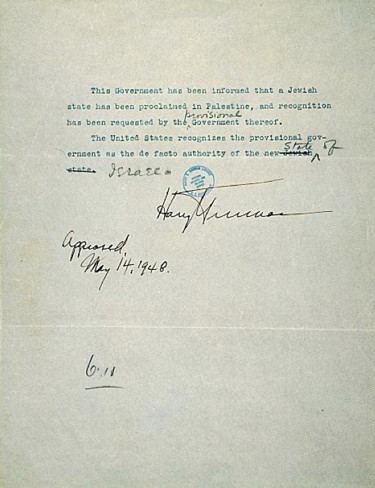
Wider Considerations
For all the tragedy that the Palestinians have undergone for what must seem like an interminable length of time, we should not forget that solving their situation also carries wider implications. What would seem to be important is that we not misread the situation. All the signs are there as to the direction in which Israel is heading. If it is not brought under control we may be faced, at worst, with nuclear holocaust in the Middle East. Yet the West continues to treat with Israel; to admit it (2010) to the OECD, to keep the Association Agreement in place rather than suspend it (in the case of the EU), to supply aid and military equipment on a vast scale (in the case of the States). What fuels this? There is no point in mouthing statements of disapproval on account of continued settlement building, or statements of aspiration of our ideals for the Middle East if we fail to take action. Yet it would seem that the only ‘action’ that the West contemplates taking pertains to Iran. We may well not like the present Iranian regime, may fear the idea of it acquiring a nuclear weapon. But that is not the only problem on which we should concentrate. It is believed that Israel has for many years had a nuclear capability (which it has not declared); yet the West turns a blind eye. No wonder the Arab world sees us as two-faced. Were Israel to be brought under control, were there some bounds as to what its paymasters, the West, would tolerate, might this not take the wind out of the sales of whatever Iran may contemplate? Have we so far underestimated the degree of anger in the Arab world over what the West tolerates in relation to Israel? It is time we saw ourselves as others see us.
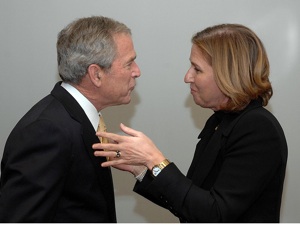
Moshe Milner
Tzipi Livni’s photostream
USA President George Bush with Israeli Foreign Minister Tzipi Livni at the UN New York, 13 Nov. 2008.
There is no reason to think that Israel will cease from such behaviour. Rather might it be thought to be a rogue state, increasingly out of control, with an expansionist momentum that has not been satiated. If Israeli objectives in the 2008-09 attack on Gaza were, among others, to topple the Hamas government and to free the captive Israeli soldier Shalit, thus far they have failed on both counts. The IDF was essentially thwarted by Hizbollah in its 2006 attack on the Lebanon, its showing held by many in Israel to be a matter of national disgrace; such that knowledgeable observers (as Norman Finkelstein) judge that part of the aim of the attack on Gaza was to restore Israeli ‘deterrence’. We should remember also that many an Israeli was apparently not horrified by what their country did in Gaza. A poll conducted in February 2010 found that more than half of Jewish Israelis favoured a new strike; indeed 67% criticised their government for not having carried this out.(16) Indeed there was considerable dissatisfaction with how the war ended: as one Israeli remarks in a video: ‘I mean the rest of it was great but the end – it just sort of stopped very abruptly and stopped too soon.’ The veteran Israeli writer and founder of the Gush Shalom peace movement Uri Avnery tells us (and he should know): ‘The public believes that in Gaza the army functioned well. The fact that a total of six Israeli soldiers were killed by enemy fire, while over a thousand people died on the other side, has reinforced this belief. Only [a] few people are bothered by moral scruples.’(17) In the West we are for the most part simply living in a very different world than is the increasingly belligerent Israeli populace. We must not fall into the trap of failing to recognise this difference.
All is not quiet on the Israeli front. Mark Levine, the American scholar of the Middle East, tells us that, the very day that the Goldstone Report was released, Ha’aretz reported that Israel’s military leadership was preparing the country for a further invasion of Gaza ‘detailing discussion of attacks on innumerable homes, mosques, schools, hospitals and other civilian facilities’.(18) On 16 January 2010 there followed a report that Israeli forces had completed a large-scale military drill in the Negev, it was thought preparing troops for such an offensive.(19) Then in the summer of 2010 there was a very real scare that Israel was about to attack Iran, some thought immanently. That may of course still be on the cards as an objective. Thus far Israel has contented itself (in what was a joint Israeli-American operation) with setting back the Iranian nuclear programme through introducing a super-cyberbug. Most recently some (such as Finkelstein) have warned that Israel may be about to unleash a further war on the Lebanon. No one can doubt the extraordinary danger that that would entail. An attack on Hezbollah would be, by proxy, a war with Iran; and might indeed lead to war with Iran, which would surely move to support Hezbollah if it looked likely to be defeated. Meanwhile Israel, as we have good reason to believe, has nuclear weapons – which it may not be too fanciful to suggest it might use in a situation of desperation. Even if this were not the case, the IDF would be unlikely to let Hezbollah ‘defeat’ the Israelis in yet a third Lebanese adventure. There are unnerving comments around (BBC ‘The World at One’, 5 Jan. 2011) that the question is simply the timing of the next war between Israel and Hezbollah; the Israelis saying that ‘next time they will go in much harder’. In a cable dated 15 November 2009 that became public through the Wikileaks exposure, Lieutenant General Gabi Ashkenazi, the head of the IDF, commented that he was preparing the army for a large-scale war and that on the next occasion he would not accept ‘any restrictions on warfare in populated areas’.
What we saw in Gaza may be little more than a presage of things yet to come. We could be heading for a military explosion in the Middle East of proportions the likes of which we have not yet seen and sooner rather than later. A professor at the Hebrew University in Jerusalem, Martin Van Creveld, commented in September 2003 of Israel: ‘We have the capability to take the world down with us. And I can assure you that that will happen, before Israel goes under.’(20) It is in this wider context that the imperative of solving the Palestinian question becomes overwhelming. It is clear of course that Israel’s position in the Middle East has significantly weakened as a result of the ‘Arab Spring’. But this does not necessarily mean that Israel will become any less bellicose: it will feel more threatened. Much will depend on the position of the United States and here it is only too clear that there is a widening gap between Obama on the one hand and many members of Congress, both Democrats and Republicans on the other.
Note
Under the Geneva Conventions it is not permissible to cause civilian deaths unless one is oneself attacked in which case one may defend oneself. Thus it could be argued that in sending missiles into Israel Hamas committed a ‘war crime’ (for they might cause civilian deaths); but it was not illegal for them to do so once Israel had launched its ground offensive. This raises (it seems to me) the interesting question as to whether Gaza is in this to be considered a separate entity. Could it not be said that the West Bank was already illegally occupied by Israel and thus, if Gaza is also part of Palestine and the Gazans think of themselves as part of the Palestinian people, that it was permissible for them (as they were able to do so and those on the West Bank were not) to attack Israel? Furthermore, was it not an act of aggression on Israel’s part to maintain an illegal siege of Gaza? But even if the sending of missiles should be declared illegal under international law, we need to note the disparity between the number of Gazans and the number of Israelis who were being killed during the years before the Israeli assault on Gaza in December 2008. Indeed, the lion’s share of the condemnations of the Goldstone Report were laid at Israel’s door.
Footnotes
(1) This opinion owes to Jeff Halper, who has extensively researched these issues, Obstacles to Peace, p. 113.
(2) Cf. Congressional Research Service: Jeremy M. Sharp, ‘U.S. Foreign Aid to Israel’, 16 Sept. 2010. http://www.fas.org/sgp/crs/mideast/RL33222.pdf
(4) Ghada Karmi, ‘Is Peace in the Middle East Possible?’ article on the website of Labour Friends of Palestine.
(5) Quoted (among others) by the Foundation for Middle East Peace, ‘Israeli Settlements in the Occupied Territories: A Guide’, Settlement Report, vol. 12, no. 7 (March 2002). Also in ‘The Battle Over Palestinian Representation’, Agence Global, 04.11.09, www.israeli-occupation.org/2009-11-06/nadia-hijab, JfJfP website.
(6) Michael White in conversation with Sir Gerald Kaufman, MP, Website of Labour Friends of Palestine and the Middle East.
(7)http://www.middleeastmonitor.org.uk/articles/middle-east/1491-khaled-meshal-lays-out-new-hamas-policy-direction (4 Sept. 2010)
(8) Alastair Crooke, ‘Blair’s counter-insurgency “surge”, Al Jazeera, 25. Jan. 2011.
(9) Cf. Halper op. cit. , Appendix II ‘Israeli Violations of the Fourth Geneva Convention’.
(10) New York Times, 5 May 2009
(11) Hasan Abu Nimah ‘The Shortcut to Peace’, The Electronic Intifada, 28 Jan. 2009.
(12) Organised by the Middle East Monitor, 21.12.2010. There are videos on-line.
(13) Jeff Gates ‘The U.S.-Israeli Train Wreck’, Rebel News, 28 May 2011.
(14) Cf. Wikipedia, Dahiya doctrine.
(15) LeVine op.cit. referring to an article in Ha’aretz.
(16) www.youtube.com/watch?v=4GUX_7UUCu4 (01.02.10)
(17) ‘One Year after Cast Lead’, http://zope.gush-shalom.org/home/en/channels/avnery/1261408947, 26.Dec. 2009, published on the JfJfP website.
(18) Mark LeVine ‘What Goldstone says about the US’, Aljazeera.net, 12 Nov. 2009.
(19) Ma’an News Agency, 16.01.10.
(20) Wikipedia Dahiya doctrine.

Mural on the Wall in Bethlehem
This page is the second page of a two-page narrative of which The Present Impasse is the first part.